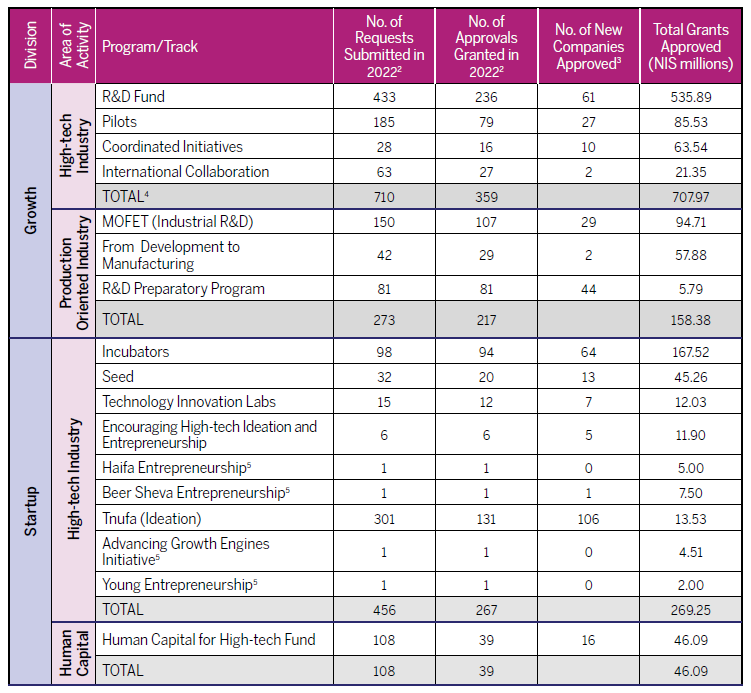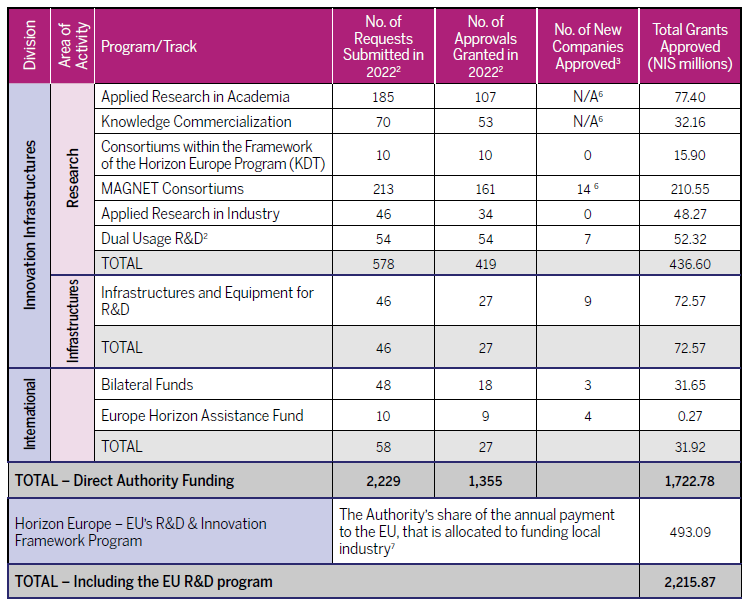The Israel Innovation Authority endeavors to provide a solution to the different challenges facing the Israeli innovation hub via three operational units called “divisions”. Each division is mission oriented and offers a unique toolbox that is adapted to the different challenges inherent in the various stages of the technological lifecycle.
The Innovation Authority’s divisions undertook a variety of initiatives during 2022 with the aim of advancing the growth of the Israeli innovation hub. The table below details the different divisions’ activity last year, according to the programs they operate A description of the various tracks and programs appears on the Innovation Authority website and in previous reports published by the Authority.:


[02] 8-12 weeks elapse in most requests between the time a request is submitted and the time it is brought to the committee for approval. Accordingly, the figures for 2022 approvals also include requests submitted at the end of 2021, and some of the submissions for 2022 (those submitted at the end of the year) were only discussed by committees in 2023. This is particularly relevant in the Dual R&D Program that was suspended during most of 2021 and was reopened towards the end of the year and where, of the total number of approvals in 2022, more than 30 were of requests submitted at the end of 2021, while the number of requests submitted at the end of 2022 that were discussed in 2023 is significantly lower.
[03] The requests and approvals are presented according to files submitted. Some companies have several submissions and even several approvals in the same program or in several programs. Accordingly, companies that first received grants from the Authority in 2022 and which received more than one grant in the same program, are counted once under the definition “new companies in the same program”. Companies that first received grants from the Authority in 2022 in two different programs, are counted in each of the programs as “new companies”. Accordingly, a total of 419 new companies were approved in 2022.
[04] The total activity in the Growth Division – in addition to the programs detailed here, the high-tech industry also includes 1.6 million shekels that were allocated to medical and biotechnology R&D centers – Program 35.
[05] The Haifa Entrepreneurship, Beer Sheva Entrepreneurship, Advancing Growth Engines, and Young Entrepreneurship programs in the Startup Division are initiatives in which a franchisee is chosen to run the initiative for several years. During each year of the franchise, the franchisee is required to submit a yearly work plan before approval of the grant.
[06] In the Innovations Infrastructures Division, the grants in the Applied Research in Academia and Knowledge Commercialization Programs as well as some of the grants in the MAGNET Consortiums are awarded to researchers in academia. The number of submissions and approvals in these programs relates to all those submitting requests, however the number of new companies approved relates exclusively to companies (and does not include researchers).
[07] The Authority pools resources from the participating government entities – The Committee for Budget and Planning, The Ministry of Innovation, Science and Technology, and the Innovation Authority – and transfers the annual participation payment to the EU. The total participation payment in 2022 was NIS 1,233 million – approximately EUR 341 million.
